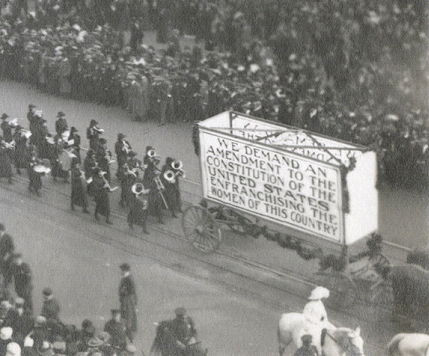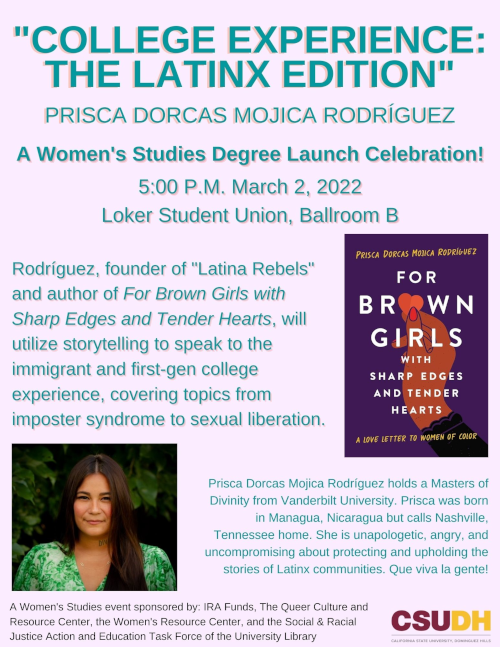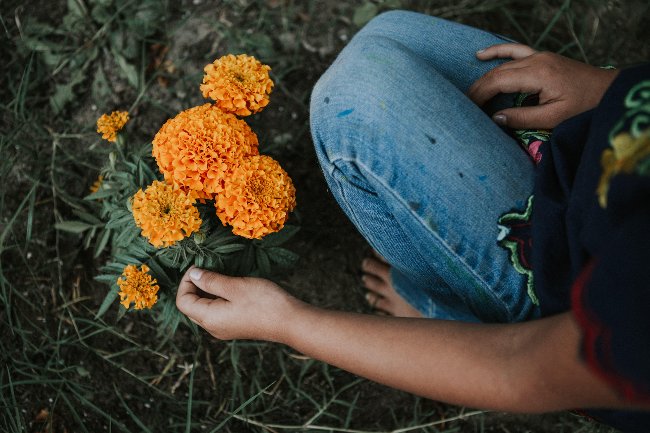News and Events
Latest News
The Women’s Studies Program and CSUDH’s Gerth Archives and Special Collections present the new Exhibit "100 Years of the Women's Vote"

This exhibit honors the 100-year anniversary of the 19th Amendment, highlighting historical and contemporary successes and struggles as they relate to the enfranchisement of women and marginalized groups. In the fall of 2019, students in WMS 320: Feminist Principles spent the semester studying women's movements on a local, national, and global level. Working with staff from the CSUDH Donald R. & Beverly J. Gerth Archives & Special Collections, students collected information, materials, and images to create posters and display cases related to the Suffrage Movement and women's political participation over the past 100 years. Students also researched and interviewed local organizations and individuals in order to highlight contemporary women and women’s issues that are relevant to our current political moment and the continued fight for women’s rights.
The final project culminated in the posters, display cases, and zine that are featured in this online exhibit. Students in WMS 100: Gender, Sex, the Body & Politics also contributed to the creation of the posters on contemporary women's issues, as well as art images for the exhibit's zine.
The physical exhibit will be on display at the Gerth Archives and Special Collection on the 5th Floor of Library South through 2021.
This project was made possible with support from California Humanities, a non-profit partner of the National Endowment for the Humanities. Visit calhum.org.
Women’s Studies Program Statement in Support of Black Lives Matter and the Demands of the Africana Studies Department

CSUDH’s Women’s Studies Program supports the demands put forth by the Africana Studies Department, whose letter and action items can be found and signed here. We encourage our peers to investigate the ways in which their departments support what bell hooks refers to as “imperialist, white-supremacist, capitalist patriarchy.” We unequivocally affirm that Black Lives Matter, and we will continuously ensure that our intellectual and activist work reflects this insight. Our curriculum has been, and will continue to be, grounded in decolonizing pedagogy; the works and theories of women of color; and queer, non-binary, and gender-expansive voices and worldviews.
As an academic discipline that views teaching, learning, and activism as part of an inseparable whole, we stand in solidarity with our Black students and those risking their lives protesting the routinized state violence, inhumanity, surveillance and murder of Black bodies in the United States. #BlackLivesMatter was founded by three Black women -- Alicia Garza, Patrisse Cullers, and Opal Tometi -- though their herstory is often overshadowed and their queerness invisibilized. We say the names of Sandra Bland, Breonna Taylor, Reika Boyd, Mya Hall, and Korryn Gaines and countless other Black women and trans people who are victims of police violence. We especially shine light on the death of Nina Pop and other Black trans women whose murder rates are seven times higher than that of the general population. Locally, we understand the contemporary moment within a long history of radical resistance in Southern California. This history ranges from the Cooper Do-Nut Riots, where police brutality rooted in racism, transphobia, and homophobia was resisted and exposed by Black and brown transwomen; to the Watts Rebellion, which won major gains for South LA, including the establishment of CSUDH; to the 1992 Los Angeles Uprising in response not only to the LAPD’s brutal assault of Rodney King, but also the state-sanctioned murder of fifteen-year-old Latasha Harlins. As feminists we honor this history of resistance and are committed to reflect it in our pedagogy.
White supremacy is our nation’s greatest ill, and the feminist movement has not escaped its contagion. As we continue our work to imagine and cultivate a more just world, we recognize that our labor is aligned with, and indebted to, the critical intellectual, emotional, and physical work that countless others, particularly Black women and other women of color, have done before us. Our faculty and curriculum acknowledge this history while working toward a more inclusive movement to end sexism in tandem with intersecting facets of oppression including race, class, sexuality, ethnicity, and religion.
We know there are no options besides demanding a better future. Today, and always, we send love and strength to our students. Turning thought into action, they pave the way for a more hopeful future for all.
CSUDH Students attend the National Women’s Studies Association’s Annual Conference 2019 in San Francisco
%20and%20Shannon%20Minor.png)
Faculty members Cristina Rose Smith and Jenn Brandt presented at the National Women’s Studies Association’s annual conference in San Francisco. Also in attendance were Women’s Studies major, Raquel Serrano (pictured with Angela Davis), and CSUDH graduate Shannon Minor, who presented a research poster from her Independent Study in Women’s Studies.
Las Doctoras Podcast featured on Oprah Magazine online

Women’s Studies professor Dr. Cristina Rose (Smith) and Chianca/Chicano Studies professor Dr. Renee Lemus's podcast Las Doctoras was recently featured online in Oprah Magazine!
Together, Dr. Cristina Rose and Dr. Renee Lemus host a podcast called Las Doctoras in which they discuss issues of reproductive justice, social justice, motherhood, sexuality, race, gender and more. They bridge their scholarly research as academics with our experience as Latinas, mothers, daughters, partners, and women to speak to the nuances and complexities of those intersecting identities.
Congrats to Raquel Serrano and Makonnen Tendaji Nixon for joining MMUF
.png)
College Experience: The LatinX Edition

Cristina Rose (Smith) Named 2021 Catherine H. Jacobs Outstanding Faculty Lecturer

"When Cristina Rose (Smith) is teaching, she doesn't just lecture while students jot down notes. Rather, Rose acts as an active and engaging facilitator of conversation - letting students take the lead in their own discoveries. Rose, who has taught in the CSUDH Women's Studies program since 2014, describes herself as relational and feminist in her teaching approach. Her pedagogy is 'less about having the answers, and more about asking the questions that will bring us into fuller lives,' she says."
Dr. Jenn Brandt awarded prize by the Popular Culture Association
.png)
Dr. Cristina Smith presents Semillas de las Abuelas at the 2019 Gloria Anzaldua International Conference: Translating B/borders

Dr. Cristina Smith will present at Semillas de las Abuelas: Teaching to Reclaim in the B/borderland Family at The Gloria Anzaldua International Conference: Translating B/borders on May 16-17, 2019 University of Paris VIII, Paris, France.
Our writing speaks to how we are growing ruda in our family and community gardens. As professors and mothers, we situate our work in a critique of this country’s borders and its history of colonization that perpetuated violence, slavery, and genocide on our ancestors. We also engage in the reclamation of the Borders our families occupy in spiritual and energetic divided spatialities, particularly in a pedagogical framework entrenched in systems of power meant to sustain a patriarchal, white supremacist, capitalist ideology in our children. We trust we can offer our children the space for true liberation and the tools to grow their own ruda for generations. It is in that spirit that we create this paper as an introduction to a book which will be a collection of tools both practical and theoretical to resist and liberate us and our children from oppressive forces while we celebrate our ancestral cultures and histories.